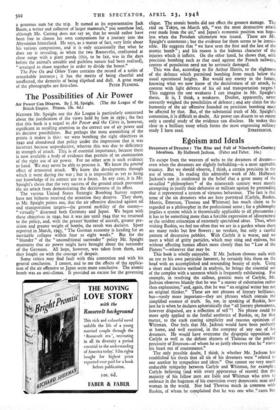The Possibilities of Air Power
NEITHER Mr. Spaight nor the Air League is particularly concerned about the justification of the views held by him in 193o ; the fact that this book is a sequel to Air Power and the Cities is, however, significant in recalling attention to the correct use of air power and its decisive possibilities. But perhaps the most astonishing of the points it makes is this : we were bombing the right objectives in 1940 and abandoned that policy under the impression that it was incorrect. because unproductive, whereas this was due to deficiency in strength of attack. This is of essential importance, because there is now available a body of evidence that permits of an examination of the right use of air power. For no other arm is such evidence to hand. We may never be able to procure it. We know the general effect of armoured attack. We know the developments through which it went during the war ; but it is impossible as yet to bring our knowledge of its correct use to a focus. In any case, it is Mr. Spaight's thesis that the very success of the ground attack prevented the air attack from demonstrating the decisiveness of its effect. The various United States Strategic Bombing Survey reports have not hitherto received the attention they deserve. They show, as Mr. Spaight points out, that the air offensive directed against oil and transportation targets—the general mobility of the enemy- " virtually " disarmed both Germany and Japan. We began with these objectives in 1940, but it was not until 1944 that we returned to the policy, and, with the greater number of aircraft,. greater pre- cision and greater weight of bombs, the result was decisive. Speer reported in March, 1945, "The German economy is heading for an inevitable collapse within four to eight weeks." But for the " blunder " of the " unconditional surrender " policy Mr. Spaight maintains that air power might have brought about the surrender of the Germans. All hope, however, was taken from them, and they fought on with the courage of despair.
Some critics may find fault with this contention and with his general conclusion. I cannot, and to me the effects of the applica- tion of the air offensive to Japan seem more conclusive. The atomic bomb was an anti-climax. It provided an excuse for the governing clique. The atomic bombs did not effect the greatest damage. The raid on Tokyo, on March 9th, " was the most destructive attack ever made from the air," and Japan's economic position was hope- less when the Potsdam ultimatum was issued. These are Mr. Spaight's statements ; but the evidence for them seems to be irresis- tible. He suggests that " we have seen the first and the last of the atomic bomb " ; and his reason is the hideous character of the injuries which it inflicts. On the other hand, he shows that, with precision bombing such as that used against the French .railways, centres of population need not be seriously damaged.
This was due, according to Sir Arthur Harris, to the slightness of the defence which permitted bombing from much below the usual operational heights. But would any enemy in the future, knowing what we now know of the decisiveness of air attack, be content with light defence of his oil and transportation targets ? This suggests the one weakness I can imagine in Mr. Spaight's thesis. It is, I think, a weakness. Douhet, apparently,- never correctly weighed the possibilities of defence ; and any claim for the humanity of the air offensive founded on precision bombing must be affected by that. But, of the substantial truth of Mr. Spaight's contention, it is difficult to doubt. Air power can disarm to an extent only a careful study of the evidence can disclose. He makes this clear in a brilliant essay which forms the most engrossing military


































 Previous page
Previous page